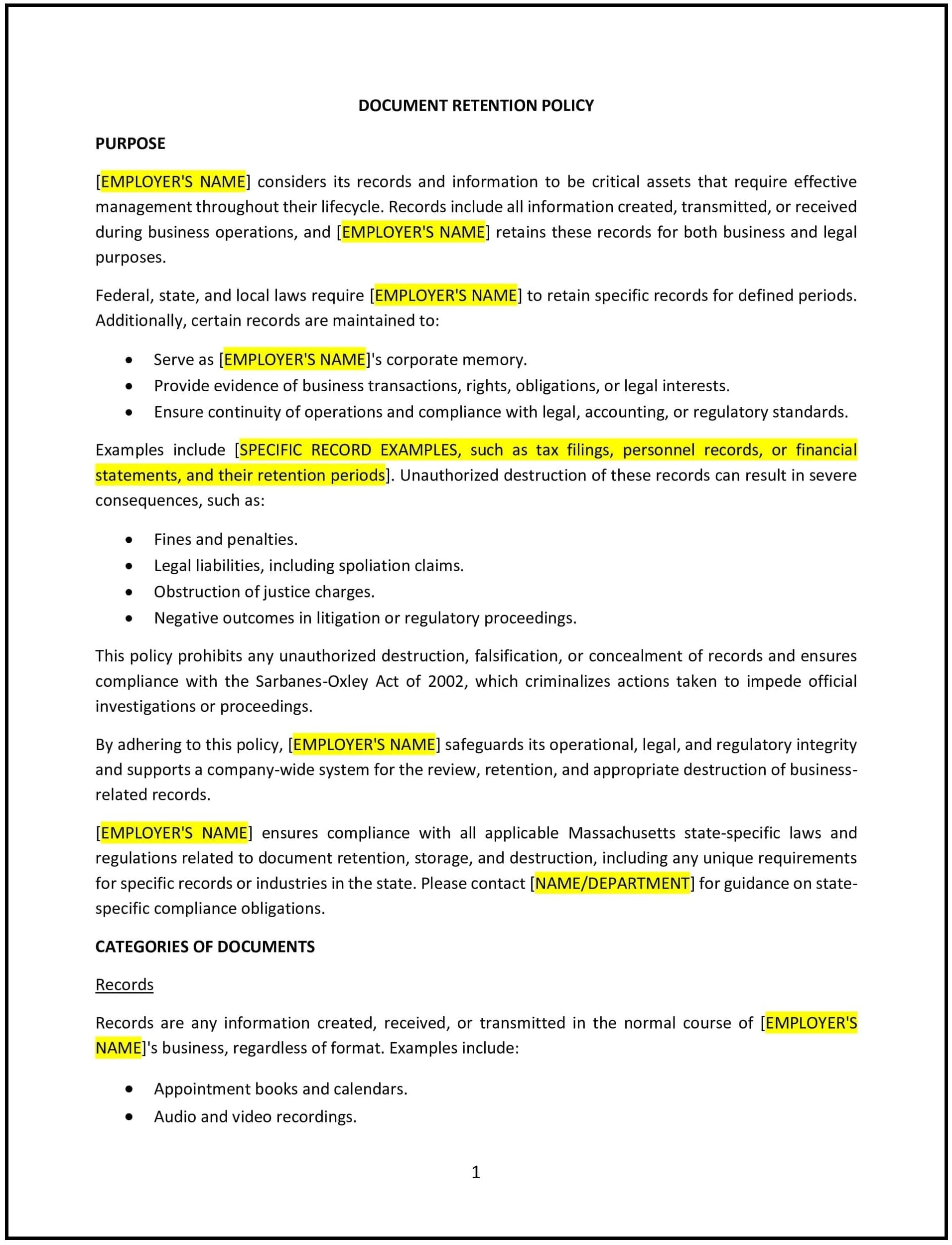Document retention policy (Massachusetts): Free template
Got contracts to review? While you're here for policies, let Cobrief make contract review effortless—start your free review now.

Customize this template for free
This document retention policy is designed to help Massachusetts businesses establish guidelines for retaining, storing, and disposing of company documents. The policy outlines how long various types of documents should be kept, the procedures for storing them securely, and the steps to take when documents are no longer needed. It ensures that businesses comply with Massachusetts state laws and federal regulations regarding document retention, data privacy, and security.
By adopting this policy, businesses can reduce the risk of legal issues related to document management, ensure compliance with regulatory requirements, and improve overall organizational efficiency.
How to use this document retention policy (Massachusetts)
- Define document types: Specify the types of documents that fall under this policy, such as financial records, employee records, contracts, emails, tax documents, and other business-related paperwork. The policy should outline the retention requirements for each type of document based on legal and business needs.
- Establish retention periods: Set clear retention periods for each document type based on Massachusetts state laws, federal regulations, and industry-specific guidelines. For example, tax records may need to be kept for seven years, while employee records may be kept for a specified number of years after an employee’s termination.
- Determine storage methods: Specify how documents should be stored, whether electronically or in physical form. The policy should include guidelines for secure storage, including encryption for digital records and locked storage for physical documents.
- Establish procedures for document disposal: Outline the procedures for disposing of documents that are no longer needed, ensuring they are destroyed in a secure manner to prevent unauthorized access to sensitive information. This may include shredding physical documents and securely deleting electronic files.
- Assign responsibilities: Define who is responsible for managing and overseeing document retention and disposal. This may include roles such as records managers, HR personnel, or department heads. The policy should specify who is responsible for monitoring compliance with the document retention schedule.
- Ensure compliance with legal and regulatory requirements: The policy should comply with Massachusetts state laws, federal regulations, and industry-specific standards regarding document retention, including those related to tax records, employee privacy, and data protection.
- Protect sensitive information: Specify how sensitive information, such as personal data or proprietary business information, will be protected during storage and disposal. The policy should outline security measures, including encryption, access controls, and employee training on confidentiality.
- Review and update regularly: The document retention policy should be reviewed periodically to ensure it is compliant with changing laws, regulations, and business practices. Updates should be made as necessary to account for any legal or operational changes.
Benefits of using this document retention policy (Massachusetts)
This policy offers several benefits for Massachusetts businesses:
- Reduces legal risks: By following a structured document retention and disposal process, businesses can avoid the risks associated with retaining documents longer than necessary or improperly disposing of them, which can lead to legal liabilities.
- Ensures compliance with laws and regulations: The policy helps businesses comply with Massachusetts state laws, federal regulations, and industry standards regarding document retention, reducing the risk of fines or penalties for non-compliance.
- Protects sensitive data: The policy helps protect sensitive business and personal data from unauthorized access by ensuring proper storage and disposal procedures.
- Improves operational efficiency: By establishing a clear document retention schedule, businesses can reduce clutter, streamline storage, and ensure that documents are easily accessible when needed, improving overall efficiency.
- Enhances data security: Properly managing document retention and disposal minimizes the risk of data breaches or unauthorized access to confidential information.
- Supports business continuity: A well-managed document retention policy ensures that important records are available when needed for audits, litigation, or regulatory purposes, supporting business continuity.
Tips for using this document retention policy (Massachusetts)
- Communicate the policy clearly: Ensure that all employees are aware of the document retention policy and understand their responsibilities for storing and disposing of documents. This can be done through employee handbooks, training, and internal communications.
- Use document management software: Consider using document management software to streamline the process of storing, organizing, and tracking documents. These tools can help automate retention schedules and ensure that documents are securely stored and disposed of on time.
- Review retention periods regularly: Regularly review and update retention periods to ensure they remain in compliance with current laws, industry practices, and the company’s operational needs.
- Ensure secure disposal: Train employees on the importance of securely disposing of documents, including shredding physical documents and permanently deleting electronic files to prevent unauthorized access.
- Monitor compliance: Conduct periodic audits to ensure that employees are following the document retention policy and that the company is compliant with legal requirements.
- Review and update regularly: Periodically review and update the policy to ensure it remains compliant with Massachusetts state laws, federal regulations, and any changes in the company’s operations or document management practices.